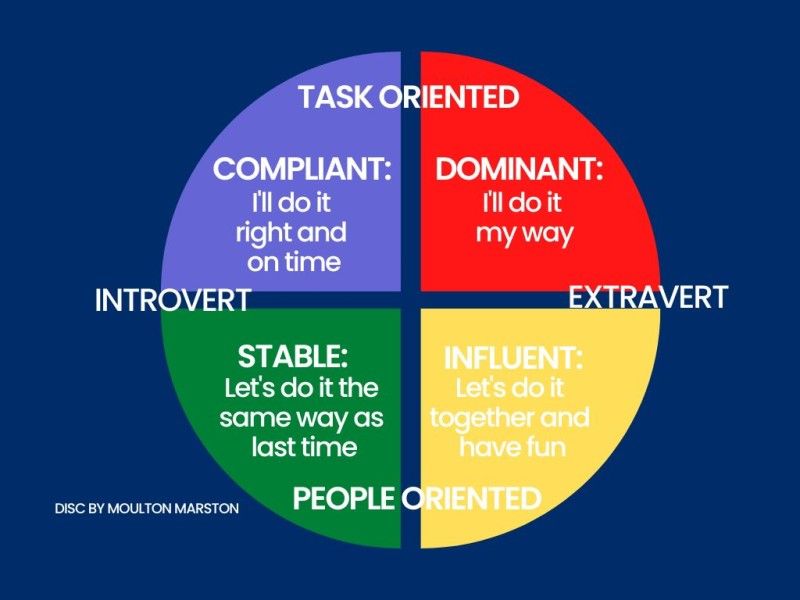Stop Acting Like That.... and use The DiSC Model To Become More Self-Aware
Increase your self-awareness and change your life. Close your eyes and retrieve a positive memory from when you were a toddler. What kind of a kid were you? Shy, playful, bossy, clumsy...? Which of these personality traits are still noticeable? Which of these do you miss? What happened to this kid?
I can tell you what happened. Life hit you just like it hits every single one of us. Those who were quiet and shy grew up hearing we should speak up, be more this and more that. Those who were bossy and full of energy were asked to calm down and behave.
Basically, we have never been invited to embrace our behavioral preferences. Few are those who in childhood were encouraged to grow up building on these preferences to create the right environment for them to flourish.
Do you relate?
As a coach and a positive psychology practitioner, I have an evidence-based theory and multiple clients’ cases about the power of increased self-awareness.
It is never too late to learn.
If you stopped acting and started appreciating your preferred behaviors, observing and accepting other peoples’ preferred behaviors, you could thrive and perform in every area of your life.
In this article, I will take you on a short self-awareness journey that could immediately impact you, your self-appreciation, your relationships and your leadership. Let's take a look at the DiSC model.

If I called you up and invited you to a cocktail tonight, how would you feel?
I) Excited, you want to know more; you start to imagine the fun, and you even know what to wear. You don’t even ask who will be there.
Of course, you go.
S) Flattered, yet embarrassed as it’s tonight and it was not expected. It is Tuesday, it's midweek, and it is not reasonable to go out. You ask who will be there. You realize your friends will go, and you consider joining me, yet it is still making you feel rushed and uncertain.
You go as it seems important to me to have you there.
D) You kindly decline as you have other plans. You visualize people chatting about superficial things—gosh, you get so frustrated when people waste time. I tell you one of your potential clients will be there. You reconsider and say you might be able to come to say hello before going to your other appointment.
You stop by 30 minutes after the start to be seen and to see the potential client.
C) When? Tonight? At what time? Until when? What’s the reason for the cocktail? Who will be there, and why am I invited? It is a bit late notice; you will have to rearrange your plans. Is there another cocktail later?
You probably will not go.
Which affirmation describes you?
There’s no right or wrong. William Moulton Marston was among the first psychologists to study normal people’s emotions. He came up with 116 combinations of the four main preferences I invited you to look at. We tend to be either extroverted (D & I) or introverted (S & C). Then we prefer people (S & I) or tasks (D & C).
Now you say, "for me it depends." And I will say, no, your preferences do not depend, but your adapted behavior does. The sad reality is that lack of self-awareness and self-management often leads to situations where everyone is adapting to everyone’s adapted behaviors.
Identifying your own preferences and learning how to identify other people's preferences can totally transform your life and your relationships at home and at work. You can become proactive and mindful, creating the conditions to evolve in your comfort zone and managing situations outside your comfort zone. As a parent or a manager, you can become confident in assuming your extroversion or introversion, your appetite for people or for tasks. You can appreciate that everyone is unique and give them space.
The above does not happen overnight or thanks to a one-shot survey. There will be doubts and interrogations. I encourage personal and collective reflection to identify your core preferences versus what life, education and experience have taught you. When done to its fullest extent, it can be truly life-changing. Here's an idea to start.
How do you feel about sharing this article with a person you work with or live with every day?
It will be an opportunity for both to appreciate your different behavioral preferences and consider giving each other feedback on how you experienced a specific conversation.
Separately, each party should write down the letters of the DiSC affirmations retained for self and for the other party. What made you choose those affirmations?
Now recall your last conversation. What was said? How did you feel? What was the outcome? Did the other party speak too much and it annoyed you? You might have a D preference and she an I. If she was too fast-paced and bossy, making you feel disliked, it might be the other way around.
Did she ask a lot of questions and you got frustrated? She might be a C and you are not. If she wanted to try new things and you did not, she might be a D or an I and you more an S or a C.
If both of you were speaking at the same time and not giving the other party space, you might both be a D or an I. If both were giving in, expecting the other party to make a decision, you might both prefer an S behavior.
What is certain, is that the two of you are different. Meet up and honestly share your findings, respecting genuine and unconditional positive regard.
This exercise enables you to identify your preferences and realize how you are adapting. From there, you can engage to observe yourselves in action and identify when you consider being in your comfort zone or not. Your self-awareness can quickly evolve, and you can start to manage your behavior to the benefit of all involved. You can become attentive to what really matters, hence contributing to mutual thriving and performance.











